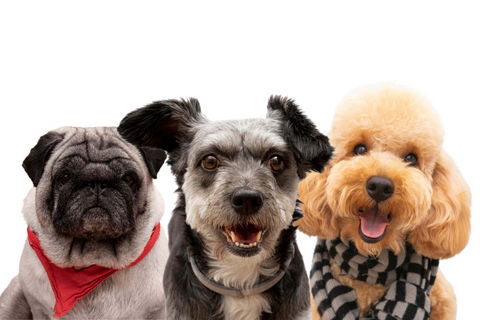
As pet parents, we all want our furry friends to feel happy, healthy and loved. But did you know that many dogs suffer from anxiety? Anxiety in dogs can be caused by a variety of factors, such as separation from their human family, loud noises, and changes in routine. Fortunately, there are many natural ways to help your pup feel more calm and more relaxed.
Exercise and Socialization: The Key to a Calmer, Happier Dog
Regular exercise and socialization are crucial for maintaining a happy and healthy dog, and they also play a significant role in reducing anxiety. Exercise helps dogs burn off excess energy and reduce stress, which can contribute to anxiety.
A tired dog is often a more relaxed and content dog. Additionally, socialization with other dogs and people can help dogs feel more confident and comfortable in different situations, reducing their anxiety levels.
There are many ways to ensure your pup gets enough exercise and socialization. Taking your dog for a walk around the block or in a nearby park is a simple yet effective way to provide exercise and mental stimulation.
You can also engage your pup in interactive play like fetch, tug-of-war, or hide-and-seek. Regular exercise not only helps to tire out your dog physically, but it also provides mental stimulation that can help reduce anxiety.
Socialization is equally important for dogs to develop good social skills and feel comfortable in different environments. Trips to the dog park, playdates with other friendly dogs, or attending dog-friendly events are great opportunities for socialization.
Encouraging positive interactions with other dogs and people can help build your dog's confidence and reduce their anxiety in new situations.
In addition to outdoor activities, you can also incorporate indoor activities to keep your dog mentally stimulated and engaged.
Puzzle toys, treat-dispensing toys, and training sessions are excellent ways to provide mental stimulation and reduce anxiety in dogs.
These activities challenge their minds and provide an outlet for their energy, helping to keep them calm and relaxed.
It's important to remember that every dog is unique and has different exercise and socialization needs. Some dogs may require more physical exercise, while others may need more mental stimulation.
Observing your dog's behavior and energy levels can help you determine the right amount of exercise and socialization for them. Consulting with a professional dog trainer or behaviorist can also provide valuable guidance in developing an exercise and socialization routine tailored to your dog's needs.
By prioritizing regular exercise and socialization for your dog, you can significantly reduce their anxiety levels and help them lead happier, healthier lives.
So, lace up those walking shoes, plan some playdates, and watch your pup thrive with a calmer and happier demeanor!
Natural Flea and Tick Deterrents: Keeping Your Pup Healthy and Happy
Flea and tick infestations can be a major source of anxiety for dogs. While it's important to protect your pup from these pests, many traditional flea collars and chemicals can be harmful to their health.
Fortunately, there are many natural alternatives to flea collars and chemicals that can be effective in keeping fleas and ticks away without harming your pup. Consider using natural flea and tick deterrents with apple cider vinegar to keep your pup healthy and happy.
Creating a Safe and Comfortable Space: Helping Your Pup Feel Secure
Creating a safe and comfortable space for your pup can also be effective in reducing anxiety. Whether it's a cozy bed in a quiet corner of the house or a crate lined with a soft blanket, having a designated space where your pup can retreat to can help them feel more secure and relaxed.
Make sure their space is free from loud noises and distractions, and consider using calming techniques like aromatherapy or music therapy to help them feel even more relaxed.
In conclusion, there are many natural ways to help your pup feel calmer and more relaxed, from regular exercise and socialization to natural flea and tick deterrents and creating a safe and comfortable space.
By taking steps to reduce your pup's anxiety, you can help them live a happier, healthier life. Happy Dog Anxiety Awareness Week!






